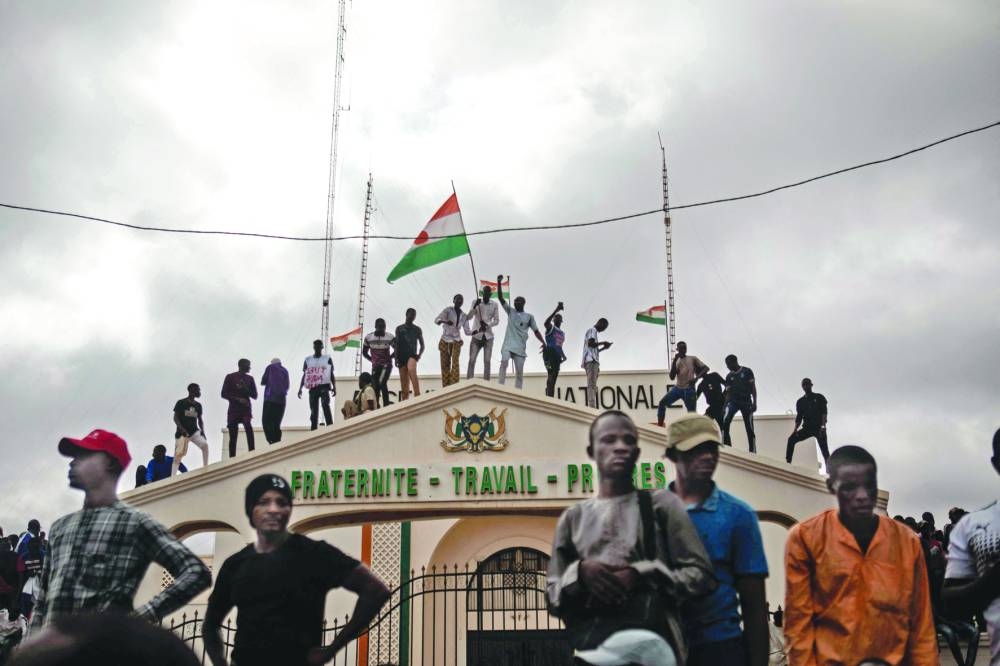West African military chiefs have agreed a plan for a possible intervention in Niger as a deadline nears for the country’s junta to restore civilian rule, an official from regional bloc ECOWAS said yesterday. The Economic Community of West African States (ECOWAS) on Sunday gave the junta that toppled elected president Mohamed Bazoum in a July 26 coup one week to restore him or face the potential use of force.
ECOWAS military chiefs were meeting in Nigeria’s capital Abuja to discuss ways to respond to the crisis. “All the elements that will go into any eventual intervention have been worked out, including the resources needed, and including the how and when we are going deploy the force,” said ECOWAS commissioner Abdel-Fatau Musah. “We want diplomacy to work, and we want this message clearly transmitted to them that we are giving them every opportunity to reverse what they have done,” he added.
Niger’s junta has vowed to respond “immediately” to any foreign intervention and has been holding Bazoum and his family in his official residence in the capital Niamey for nine days. The military-ruled governments in neighbouring Mali and Burkina Faso have said an intervention in Niger would be tantamount to a declaration of war against them.
Nigeria, which currently chairs ECOWAS, is taking a hard line against coup plotters after the putsch in Niger, the latest to hit Africa’s Sahel region since 2020. A West African delegation failed to secure the return to power of Niger’s elected government on Friday despite proposals to resolve the crisis as the junta curtailed military co-operation with former colonial power France.
The ECOWAS regional bloc’s team arrived on Thursday in the capital Niamey “but did not spend the night” as scheduled, nor meet with coup leader Abdourahamane Tiani or detained President Mohamed Bazoum, a delegation member said yesterday. At the same time, the junta announced that it was scrapping military pacts between Niger and France, citing the former ruler’s “careless attitude and its reaction to the situation”.
Niger has had a key role in Western strategies to combat an insurgency that has plagued the Sahel since 2012, with France and the United States stationing around 1,500 and 1,000 troops in the country, respectively. France rejected the coup leaders’ severing of military ties, insisting only the “legitimate” government could decide, while Niger’s ambassador to France said she did not recognise her sacking by the putschists and was loyal to Bazoum.
Regional powerhouse Nigeria holds the rotating presidency of Economic Community of West African States (ECOWAS), which imposed sanctions and on Sunday gave the putschists a week to restore Bazoum to power or risk possible armed intervention. But Niger’s government newspaper Le Sahel reported that the visiting delegation had met junta representatives at the airport and discussed “proposals to resolve the crisis”.
Nigerian President Bola Tinubu said the bloc would do its best to resolve the crisis amicably but ECOWAS said it could resort to military intervention as a last resort.
Russia, which has increased its footprint across the Sahel in recent years, warned that foreign intervention would not resolve the crisis.
“It is unlikely that the intervention of any extra-regional force can change the situation for the better,” Kremlin spokesman Dmitry Peskov told journalists.
Regional military chiefs are in Nigeria’s capital Abuja to discuss the possibility of such an intervention as Benin which neighbours Niger said diplomacy must remain the preferred solution. Niger’s junta warned it would meet force with force.
Germany called for continued “mediation efforts” to defuse the situation. The juntas in Burkina Faso and Mali have warned any military intervention in Niger would be tantamount to a “declaration of war”.
Bazoum, who has been held by the coup plotters with his family since his ouster, said Thursday that if the putsch proved successful, “it will have devastating consequences for our country, our region and the entire world”. In a column in The Washington Post - his first lengthy statement since his detention - he called on “the US government and the entire international community to help us restore our constitutional order”.
Across Niger on Thursday, thousands of people rallied to back the coup leaders on the anniversary of the country’s 1960 independence, some waving giant Russian flags and chanting anti-French slogans. Anti-French sentiment in the region is on the rise, while Russian activity, often through the Wagner mercenary group, has grown.
The European Union yesterday “strongly” condemned the blocking of French media broadcasts in Niger, where last week’s coup sparked protests against the country’s former colonial ruler.
“This step is a serious violation of the right to information and freedom of expression.
The EU strongly condemns these violations of fundamental freedoms,” EU spokeswoman Nabila Massrali said on Twitter, recently rebranded as X.
Bazoum has warned that Niger’s neighbours had increasingly invited in “criminal Russian mercenaries such as the Wagner Group at the expense of their people’s rights and dignity”. “The entire Sahel region,” he said, “could fall to Russian influence via the Wagner Group, whose brutal terrorism has been on full display in Ukraine”. Paris was also among four capitals from which the junta is recalling its ambassadors.
In a sign of normality returning in the aftermath of the coup, the putschists on Friday lifted a curfew in force since the July 26 takeover. France has evacuated 1,079 people from the country, more than half of them its nationals.
On Friday, a Spanish Air Force plane landed in Niamey to evacuate Spanish nationals - estimated to number around 70, according to the Spanish Ministry of Defence. The Netherlands said it was suspending development aid and direct cooperation with Niger’s authorities.
The United States has chartered a plane to evacuate non-essential personnel and American citizens wishing to leave the country, the State Department said.
Bazoum, 63, was feted in 2021 after winning elections that ushered in Niger’s first-ever peaceful transition of power.

Protesters hold a Niger flag during a demonstration on independence day in Niamey on Thursday.
